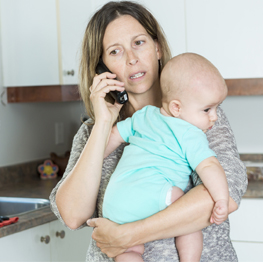
Carpool? (Check.) Work? (Check.) Lunch break? No. Pay bills and schedule doctor visits? (Check.) Pick up kids? (Check.) Homework? (Check.) Worry about bullying? (Check.) Made dinner? (Check.) Referee sibling squabbles and then collapse on the couch? (Check.) Single parents have important (and seemingly endless) responsibilities. Unless you have super powers, the stress of doing it all yourself can be overwhelming. But asking for assistance isn’t easy.
“It can be an act of tremendous courage, humility or coordination to seek out help,” says family counselor Suzanne Harrington, MA. Single parents want to feel competent and in control, and asking for help can make us feel weak or inadequate.
Even if you would like to have help, you may feel you have few resources. “Today’s families are quite isolated from extended family and community,” says Harrington. People we might ask for help are not always accessible. Grandparents may be far away, busy with their own lives or unwilling to take on child care responsibilities. Feelings of mistrust or concerns that help-seeking might be used against you in an angry custody dispute may prevent you from seeking an ex-spouse’s assistance.
Listen up, stressed-out superheroes
Asking for help is smart, even when you feel you can manage alone. Studies show social support reduces the negative health effects of stress, including coronary disease and immune suppression, and boosts your sense of personal balance and well-being. You’ll have more energy and a more positive outlook with a team of trusted helpers around you.
Parents who seek help can model reciprocity, humbleness and gratitude, says Harrington. Kids also gain exposure to other role models. “It benefits children so much to have other adults interacting with them,”says parent coach and psychotherapist Tammy Gold, LCSW, author of Secrets of the Nanny Whisperer, because both female and male family members nurture the child.
The helping community you create for your kids will likely inspire them to pitch in too. Even young children want to feel like important members of the household, says Donna Genett, Ph.D., author of If You Want It Done Right, You Don’t Have to Do It Yourself. Pitching in builds kids’competence and provides a sense of accomplishment and belonging.
Discovering the joys of teamwork
Slow down, superhero. Follow these steps to reach out and reconnect with sources of support:
Identify needs. Start by figuring out what concrete help would be most beneficial, advises Harrington. Perhaps you need child care so you can work, attend school, get counseling or just relax. A home-cooked meal once a week might lift your burden and brighten your spirits. The more specific your needs, the easier it will be to get help.
Brainstorm buddies. Develop a list of resources, including family and friends, and church and community services. Don’t be afraid to put formal sources of support, such as counseling groups, on your list. Individual or group therapy can help you heal after divorce and learn to thrive as a single parent.
Talk teamwork. If you’re on good terms with your ex, have a conversation about your parenting roles. Take a problem-solving approach. Say: “The kids need more help with science homework than I can give them” rather than criticizing: “You never help the kids with homework.”
Play to others’ strengths. Consider who is best at what and take preferences into account. If babysitting frazzles your kids’grandparents, they might prefer to host a family dinner once a week to stay involved and give you a break. That’s okay. You want this to be a win-win situation.
Help kids help you. Determine what kinds of contributions are age-appropriate for each child. Your six-year-old may be too young to vacuum, but they can set the table or sort the recycling. Older kids can take turns folding laundry or helping put away groceries. Be sure to praise kids for work well done.
Be clear. When you seek help, explain exactly what you want. Misunderstandings happen when we assume others know our expectations. If you want the bathroom squeaky-clean, explain what clean means: Towels hung up neatly, bath toys picked up, toilet and tub scrubbed, floor mopped. Set your helpers up for success.
Praise progress. You may not get the results you want right away, but be generous with your appreciation. Recognize others’ efforts instead of focusing on their shortcomings. When you’re sure they know how much you value their help, explain how they could improve. Then say thanks (again). You really can’t thank them enough.
The pressure to be a single-parent-superhero can be strong, and you may avoid asking for help because you fear you can’t reciprocate. “People don’t help because they expect your assistance in return,” says Gold. They help because they love you and care about your family. Remind yourself that everyone benefits from meaningful social connections and take pride in the helpful community you’re creating for yourself and your kids.
Super single-parent resources
For bright ideas to improve your relationship with your kids and take better care of yourself, read Jennifer Wolf’s Single Parents Blog at singleparents.about.com
Looking to connect with other local single parents? Check out the Calgary Single Parents Meetup Group at meetup.com/calgarysingleparents
Heidi Smith Luedtke, Ph.D., is a personality psychologist and mom who has learned firsthand the benefits of seeking help when times are tough. She is the author of Detachment Parenting.
Calgary’s Child Magazine © 2024 Calgary’s Child